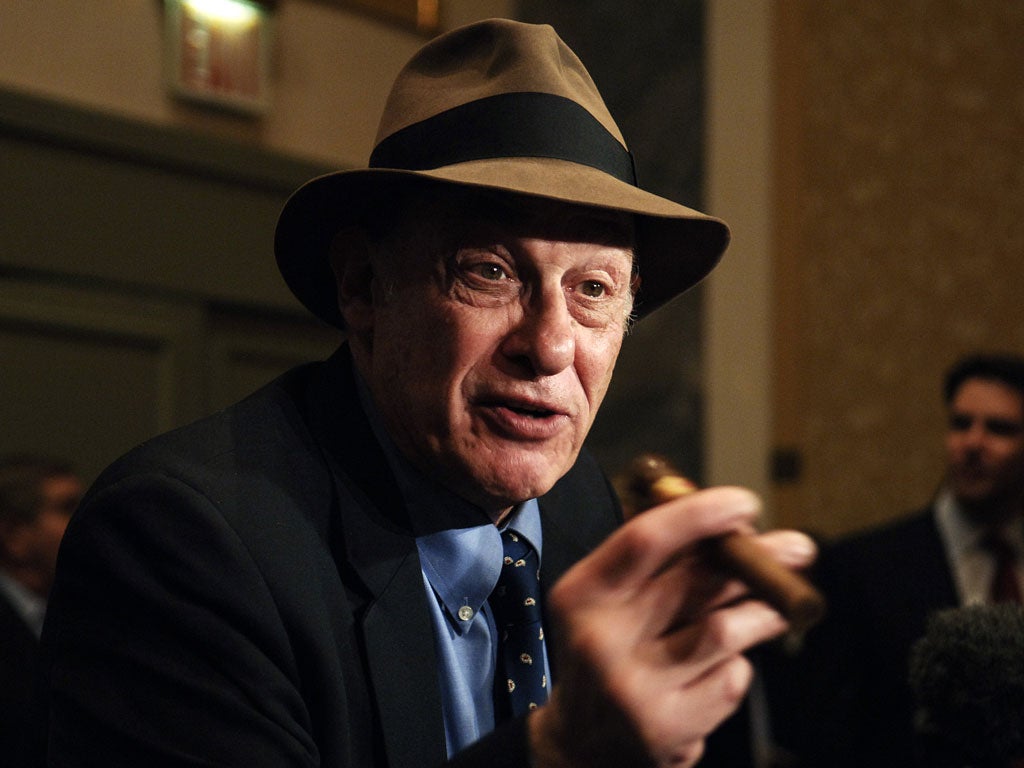Bert Sugar: Writer who lit up boxing with his colourful tales and opinions
Owing money, he gave one writer a cheque for $600. Asked if it would bounce, he said, 'like a basketball'

Bert Randolph Sugar was seldom seen in public without a fedora in winter, a panama in summer and something exotic like a Cohiba Esplendido wedged into the corner of his mouth. He arrived on the boxing scene in the early 1970s, after leaving a mediocre career in advertising, when he purchased the struggling magazine Boxing Illustrated. His arrival, contrary to a lot of the rubbish that has been written and spoken since his death, was not universally welcomed by the hardened corps of scribblers that plied their trade in boxing's trenches.
Sugar was determined to join the cabal of men that had not changed much since the days when Damon Runyon was part of their brotherhood. Sugar was never short of a tale that pushed the edges of reality, truth and fantasy; he would have enjoyed reading and hearing this week that he covered the world title fights of Joe Louis, a reign of terror that ended when Sugar had just turned 14 and started when he was one. "I was indeed an early learner," he would have pointed out to anybody intent on ruining his flow.
In 1979 Sugar upgraded and took control of the then legendary Ring magazine. He had also started to produce book after book after book and, combined with his fantastic look and inability to pass a microphone, he was soon regarded as one of boxing's main voices. It is claimed he wrote between 80 and 100 books, mostly on the sport of boxing. Many of the books were collaborations or lists but his output was prodigious and always entertaining.
He was a great peddler of nonsense in books, in articles and most importantly in person. He was never caught short on an opinion and, uniquely for a veteran scribe, he would listen to younger writers, especially if they were located near a polished mahogany bar in easy reach of drink.
His many gigs with pen and microphone meant that Sugar would often appear far from the glitz and confirmed glamour of Las Vegas or New York at a ringside somewhere in obscurity. In 1993 I arrived at a forgotten outpost called Bay St Louis in Mississippi for a one-day heavyweight tournament that was supposed to pay the winner a million dollars. However, the money had shrunk and when I got there, after a three-hour drive from New Orleans, Sugar was acting as a union organiser in the bar trying to negotiate a better deal for the fighters.
"It's crazy," Sugar explained an hour later after his soothing words had saved the show and avoided a mutiny. "The fighters were complaining about having to box for less, but they were ready to fight the men in charge for nothing."
It was at that bar that I reminded Sugar that he had used a lot of my fight reports in one of his magazines andthat I had not received a penny. Hepondered my accusation, blew a perfect smoke wall between us and promised to put it right. He never did and I never asked again, but on a dozen occasions since then he never refused my microphone in his face for a quick interview. His television interviews had to be perfect and only he would give the "go" to film at the exact moment the smoke from his ubiquitous cigar was starting to vanish.
"Bert sent me a cheque for 300 bucks and it bounced," said Mike Marley,a New York writer from the oldest ofold schools. "I saw Bert at the Garden and I said: 'Bert that cheque bounced.' He led me to the bar and said: 'Uncle Mike, take this one for $600.' So, I looked at the new cheque and I said backto him, 'Bert, will it bounce?' He looked at me through the smoke, put hishand on my shoulder and told me: 'Like a basketball!' What could I say? That was Bert."
Sugar was a master raconteur and storyteller and his eloquence, deep knowledge and wisdom will be missed whenever what passes now for the boxing fancy gathers at fights. "Too many overlook his understanding of the fight game," acknowledged Marley. "He was the real deal."
A decade ago Spike Lee hired Sugar and Budd Schulberg to work on a script for a Joe Louis film. "It was going well until Lee had to pour me out of a helicopter. Budd said that Spike was not happy," Sugar remembered from the end of yet another bar: fedora on, cigar fired and drink in hand. A minute later he was asking people to list their favourite boxing films. It would, inevitably, be in one of his books.
Last summer the cigar went out for good when he was diagnosed with lung cancer. "I would rather be a good liver, than have a good liver," he said a thousand times.
Herbert Randolph Sugar, boxing writer and publisher: born Washington DC 7 June 1937; married Suzanne (two cildren); died Mount Kisco, New York 25 March 2012.
Join our commenting forum
Join thought-provoking conversations, follow other Independent readers and see their replies
Comments
Bookmark popover
Removed from bookmarks